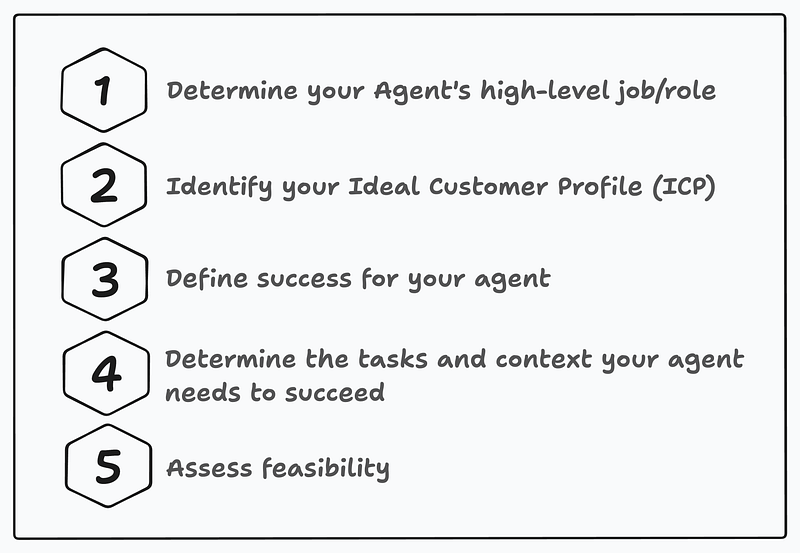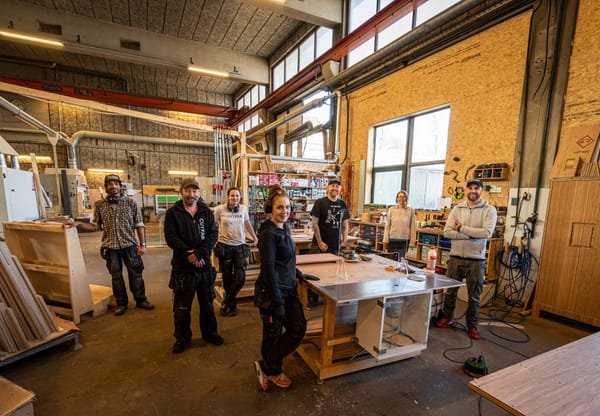How to Identify Your Breakthrough AI Startup Idea
A five-step framework for determining which AI agent idea to execute on

Imagine hiring a new sales development representative (SDR) right out of university. Could you provide them with goals and business context, then expect immediate results? While possible, you’re more likely to end up extremely disappointed.
Typically, a significant amount of resources are necessary to get a new employee up to speed. In fact, a Gallup report reveals that it takes around 12 months for a new employee to become fully productive.
The onboarding process often includes:
- A detailed job description outlining clear expectations, responsibilities, and tasks
- Regular check-ins, guidance, and course correction with the manager
- Shadowing sessions to learn from others’ success
- An onboarding buddy for asking any questions
- Explicit training sessions and materials on job execution
This article from HBR offers 14 suggestions for new managers on how to onboard new employees effectively.
While expectations for human labor are clear, the market still doesn’t quite know what to expect from AI agents. AI agents are autonomous systems performing specific tasks without human intervention. And AI agents are taking the startup world by storm. Y Combinator has 67 startups that are listed in this space as of May 2024. The problem is, building just any AI agent and expecting it to succeed can be challenging.
But don’t worry! With the right tools in your toolbox, you can identify a promising market and develop an AI agent that solves real problems. The following discusses a framework for deciding what to build, including examples of successful in-market agents and ideas yet to take off.
A framework for identifying AI startup ideas
To fully grasp the potential of AI agents, we begin by examining the key organizational needs within a company. The simplest way to identify a valuable AI agent is to consider which roles, responsibilities, and tasks you would delegate to a person. In terms of markets, think about the services or consulting models that are frequently paid for, rather than hiring in-house. This aligns with current needs and purchasing behaviors.

The one-person unicorn
While the idea of AI replacing human labor may seem unsettling, we’ve observed that all technological advances, like the second industrial revolution, have significantly reshaped the labor market. Although many jobs were lost, entirely new ones were created, leading to an economic boom (link).
In some cases, the advancement of mechanization substituted for low-skilled workers altogether. Both the number of unskilled and skilled workers increased, as their wage rates grew. Engineering colleges were established to feed the enormous demand for expertise. Together with rapid growth of small business, a new middle class was rapidly growing, especially in northern cities.
Numerous experts predict the rise of the one-person unicorn, which is the equivalent labor shift going forward. AI agents are what makes this possible.
“In my little groupchat with my tech CEO friends there’s this betting pool for the first year that there is a one-person billion dollar company,” Altman told Ohanian. “Which would have been unimaginable without AI and now will happen.”
Sam Altman, OpenAI
The framework
Step 1 — Determine your agent’s role
First, consider the expertise you bring to the table. Are you a seasoned marketer, a patent lawyer, or a PR expert? Your goal is to encapsulate this knowledge in an AI agent, tailoring it to your customer’s operational model.
Describe the experience and knowledge that this agent will possess.
Step 2 — Identify your Ideal Customer Profile (ICP)
Which companies and buyers could most benefit from your AI agent? Are they currently underserved? Can you create a new market by offering a unique price point? There is plenty of excellent material available to help define an ICP.
Step 3 — Define your agent’s success
Outline the specific responsibilities and outcomes for which they are accountable. This could include tasks like “successfully submitted patent application” or “contacted 5 publications.”
Step 4 — Determine the tasks and context your agent needs to succeed
Consider what information, context, and tools a human would need to excel at these tasks. Does your agent require a comprehensive handbook? Maybe access to an excellent email client and CRM? Will it need input from its “boss” at times? If so, how often and for what reasons?
Step 5 — Assess feasibility
Is it feasible? If all the necessary data, context, and tools are available via API, the only obstacle is execution (easier said than done, of course). So, go for it!
AI Agent Startups
We now have a way to determine good AI agent startup ideas!
When it comes to agents that are successful in-market, many of them involve roles like software development and design. My core hypothesis as to why this is the case is two-fold:
- The first people working with new technologies are developers and designers, and therefore the agents being built are based on their expertise.
- The early adopters for technology like this are tech-forward individuals whose needs often involve building digital products.
In-Market AI Software Developers
Devin made a big splash as the “world’s first software developer” on March 15, 2024. While being a very big and inspiring vision, Devin is not yet available in-market. The scope of what a software developer is responsible for is immense, and it’s quite hard to cover such a spectrum of tasks and requirements with an AI agent, especially today.
The vision is for building a general purpose “AI software developer” is large and therefore it’s naturally hard to project and see how AI could fill those large boots. After all, a software developer doesn’t simply produce code, she needs to prioritize work, fix bugs, build new features, define how things should work, test, understand customers, collaborate with other roles, and a lot more!
In-market agents narrow down the role, tasks, and target market in order to start out with a niche. What is key for these agents is that they codify knowledge about their respective fields (app development, bug fixing, and frontend development) as well as have the right tools to execute on their tasks.
Tusk — AI-created pull requests for annoying tickets
Sweep — AI Junior Developer that maintains your legacy codebase
Magic Patterns — Your new frontend assistant.
…and there are many more out there today for a variety of development needs.
Proposed AI Marketing Analyst Agent
Now let’s use the framework to develop a proposal for a competent AI agent that a skilled digital marketer could deliver based on their expertise. This can be applied to other marketing roles as well. Let’s try to keep it narrow in order to build an initial niche for the agent.
The Agent’s role
You’re a digital marketer with expertise in driving the success of PPC (Pay-Per-Click) campaigns across multiple platforms including Google, YouTube, Instagram, TikTok, Facebook, and LinkedIn. You will be instrumental in managing, building, and optimizing online advertising efforts to achieve the best possible ROI. Your core responsibility is to prepare detailed reports on campaign performance and recommend cross-channel optimizations.
The Ideal Customer Profile (ICP)
SMBs with 200–1000 employees, currently transitioning to e-commerce as a new sales channel.
Success for the agent
Significant increase in impressions and revenue from PPC campaigns.
Determine the tasks and context your agent needs to succeed
The agent would need access to all ad systems and data, access to a business intelligence or reporting tool to generate reports (e.g. Tableau) and context on performance expectations, the company’s products, and more.
Feasibility
Since all necessary resources are available via API and text input from a potential customer, it seems like an excellent opportunity to disrupt the market with an AI agent!
Proposed AI UX Researcher Agent
Let’s apply the same framework used for a digital marketing agent to develop a specialized AI agent that a seasoned UX researcher could create based on their expertise. This agent will focus on enhancing user experience insights, particularly in digital environments.
The Agent’s Role
You’re a UX researcher with deep knowledge in conducting and analyzing user behavior studies and usability testing across digital platforms. Your principal responsibilities include synthesizing complex data into actionable insights, creating user personas, and suggesting UI/UX improvements based on user feedback and behavioral patterns. You will assist teams in understanding what drives user engagement, satisfaction, and retention.
The Ideal Customer Profile (ICP)
Tech startups and mid-sized tech companies that are actively developing or optimizing digital products, such as mobile or web apps, and need to enhance user experience to increase adoption and satisfaction.
Success for the Agent
A measurable improvement in user experience metrics, such as increased user retention or higher engagement rates.
Determine the Tasks and Context Your Agent Needs to Succeed
The agent requires access to user interaction data, feedback channels, analytics tools, and design software. It needs context regarding the target user demographics, business goals, existing UX pain points, and design standards. Integration with platforms like Mixpanel, Heatmap tools, and A/B testing software would be crucial for in-depth analysis and reporting.
Feasibility
Given the digital nature of UX research and the availability of APIs to access necessary user data and analytics tools, there is a strong opportunity to develop an AI UX Researcher Agent. The technology required to analyze and interpret user behavior and feedback digitally is well-established, making this a viable AI agent that could significantly impact product development processes.
Final thoughts
AI agents are not just about technology; they involve codifying real knowledge into working models and identifying the right markets. As we stand on the brink of this game changing shift, startups have the unique opportunity to lead the charge, transforming business challenges into a solution with AI agents.
I’m not in Sam Altman’s betting pool, but seeing the tremendous activity around AI agents (and hopefully even more) makes me believe the one-person unicorn isn’t as far away as we might think.
Thank you for reading. And check out Databutton’s AI app developer for building your big AI startup!





